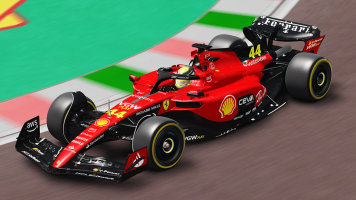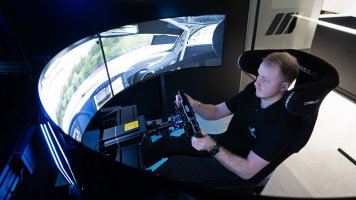A statement I see a lot from PC gamers....
"only a few people own a VR device, or can afford one, so they shouldn't be supported or developed"
Imagine a world where the people at the forefront of developing technologies listened to such narrow minded selfish claptrap?
How would you travel? There would probably be no cars, buses, planes.
You actually wouldn't be able to post that opinion anyway because there'd be no computers.
And even if there were computers there'd be no internet because there'd be no telephone lines or telephones to connect everyone up.
That would be quite boring. So maybe you'd spend more time watching TV. Except, of course, that there would be no TV.
VR is groundbreaking. It has huge potential. Already it enhances the sim racing genre of games to levels I never thought I'd experience. Yet people - people who have never experienced it - are so narrow minded as to not only dismiss it as something they're not interested in, but publicly express a desire for development of it, and for it, to stop.
Despite their best efforts, VR will continue to develop. Comparing headsets available five years down the line to the current Rift CV1 and Vive would be like comparing a 1970s TV set to an OLED 4k tv. And some game genres, more than others stand to benefit from this.
None more so than sim racing.
There's so much scope for immersion. The connection between the driver putting on a helmet and the player putting on a headset. Placing that headset takes you into the racing world. Into the car, onto the track. The co-ordination of the physical wheel in the real world to the virtual one, beautifully modelled and accurate to the virtual car being driven.
While other genres will not lend themselves to VR due to the relatively limited hand tracking technology, sim racing rises above it as it knows already what you're doing with your hands and feet due to input from wheels, shifters, pedals. And its recreating of this in the virtual world is startlingly accurate.
Popular genres such as first person shooters will only really flourish when advanced treadmills, capable of tracking the player's walking, running movements are ready. A sim racer doesn't need to worry about that. A racing driver sits in their seat, puts on a helmet, then stays in that seat until their race or session is complete and they remove the helmet.
Several game studios have worked to incorporate and develop VR integration after the release of a title. Whilst I'm sure some of this is out of support for existing owners of the title, at least one eye will be on the growing VR owning, non sim racing community. These people, who own VR, want the best experiences in VR and racing sims / games are right up there. Studios will be looking to this group and thinking they can sell copies of their minority appeal game to a wider community.
And the 'niche' tag may be a little wide of the mark - even now. It doesn't take much research to discover that the two main manufacturers of PC VR devices can't keep up with demand. They can't make them fast enough. I ordered one in January and still have not received it.
The cost to the existing gamer is not as high as some might suggest. You could say that by the time you do your next PC upgrade, it will be ready for VR. AMD and nVidia have invested in VR technology and the new range of nVidia cards were developed to support it. You probably already have a CPU capable of running VR, if you're playing rFactor2, Assetto Corsa, Project CARS.
Your average sim racer only stands to gain from the development of VR. OK maybe you're not ready to invest now, but play the long game. The price of the technology is going to come down. The cost of putting a PC together that can handle it will come down. The games / sims will establish and improve VR support over time.
Those who are not ready for VR yet can only gain by sitting back, letting the technology and software develop further, then diving in when they are ready. But compaining, de-prioritising and declaring its insignificance isn't helping, and is also inaccurate.
Would they be willing to stand by those claims one, two, five years down the line? Do we still hear people tallking of the expense, inaffordability and minority appeal of cars, TVs, personal computers now?
"only a few people own a VR device, or can afford one, so they shouldn't be supported or developed"
Imagine a world where the people at the forefront of developing technologies listened to such narrow minded selfish claptrap?
How would you travel? There would probably be no cars, buses, planes.
You actually wouldn't be able to post that opinion anyway because there'd be no computers.
And even if there were computers there'd be no internet because there'd be no telephone lines or telephones to connect everyone up.
That would be quite boring. So maybe you'd spend more time watching TV. Except, of course, that there would be no TV.
VR is groundbreaking. It has huge potential. Already it enhances the sim racing genre of games to levels I never thought I'd experience. Yet people - people who have never experienced it - are so narrow minded as to not only dismiss it as something they're not interested in, but publicly express a desire for development of it, and for it, to stop.
Despite their best efforts, VR will continue to develop. Comparing headsets available five years down the line to the current Rift CV1 and Vive would be like comparing a 1970s TV set to an OLED 4k tv. And some game genres, more than others stand to benefit from this.
None more so than sim racing.
There's so much scope for immersion. The connection between the driver putting on a helmet and the player putting on a headset. Placing that headset takes you into the racing world. Into the car, onto the track. The co-ordination of the physical wheel in the real world to the virtual one, beautifully modelled and accurate to the virtual car being driven.
While other genres will not lend themselves to VR due to the relatively limited hand tracking technology, sim racing rises above it as it knows already what you're doing with your hands and feet due to input from wheels, shifters, pedals. And its recreating of this in the virtual world is startlingly accurate.
Popular genres such as first person shooters will only really flourish when advanced treadmills, capable of tracking the player's walking, running movements are ready. A sim racer doesn't need to worry about that. A racing driver sits in their seat, puts on a helmet, then stays in that seat until their race or session is complete and they remove the helmet.
Several game studios have worked to incorporate and develop VR integration after the release of a title. Whilst I'm sure some of this is out of support for existing owners of the title, at least one eye will be on the growing VR owning, non sim racing community. These people, who own VR, want the best experiences in VR and racing sims / games are right up there. Studios will be looking to this group and thinking they can sell copies of their minority appeal game to a wider community.
And the 'niche' tag may be a little wide of the mark - even now. It doesn't take much research to discover that the two main manufacturers of PC VR devices can't keep up with demand. They can't make them fast enough. I ordered one in January and still have not received it.
The cost to the existing gamer is not as high as some might suggest. You could say that by the time you do your next PC upgrade, it will be ready for VR. AMD and nVidia have invested in VR technology and the new range of nVidia cards were developed to support it. You probably already have a CPU capable of running VR, if you're playing rFactor2, Assetto Corsa, Project CARS.
Your average sim racer only stands to gain from the development of VR. OK maybe you're not ready to invest now, but play the long game. The price of the technology is going to come down. The cost of putting a PC together that can handle it will come down. The games / sims will establish and improve VR support over time.
Those who are not ready for VR yet can only gain by sitting back, letting the technology and software develop further, then diving in when they are ready. But compaining, de-prioritising and declaring its insignificance isn't helping, and is also inaccurate.
Would they be willing to stand by those claims one, two, five years down the line? Do we still hear people tallking of the expense, inaffordability and minority appeal of cars, TVs, personal computers now?
Last edited:










